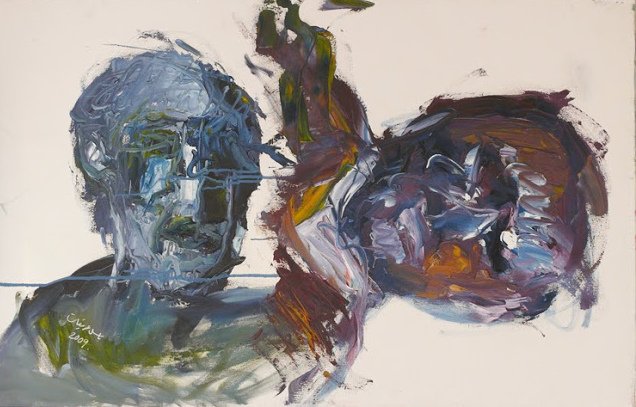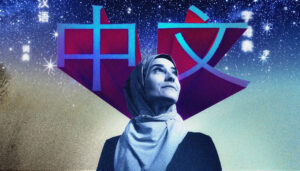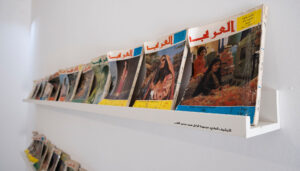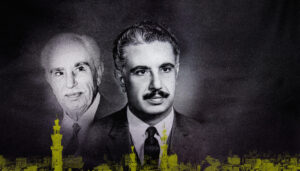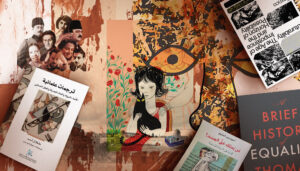In his wonderful essay Reflections on Exile, Edward Said characterises exile as “the unhealable rift forced between a human being and a native place, between the self and its true home”. What I refer to as cultural exile, then, might be described as the self’s lacking a ‘true home’ of this sort. It is a condition of dislocation, disorientation, and unrest. And yet it is at the same time a condition of promise, hope, and opportunity. What do you do when you cannot leave and cannot return? This question, which Hisham Matar poses to himself at a particularly contemplative moment of his memoir, captures the essence of the cultural exile’s predicament.
Aadam Aziz, the grandfather of Salman Rushdie’s protagonist in Midnight’s Children, who travels to Germany to train as a doctor before returning to his native Kashmir, illustrates this condition well. Our narrator vividly describes the scene of Aziz’s return and his first attempt at prayer, how “instead of the beauty of the tiny valley circled by giant teeth, he noticed the narrowness, the proximity of the horizon; and felt sad, to be at home and feel so utterly enclosed”. The nature of the colonial encounter means that Aziz’s dislocation and his sadness are felt particularly acutely, for in Heidelberg he learned, “along with medicine and politics”, that “India – like radium – had been ‘discovered’ by the Europeans”. We are told that “this was what finally separated Aadam Aziz from his friends [in Germany], this belief of theirs that he was somehow the invention of their ancestors”. And so we find him, despite their dogged presence in his mind, “attempting to reunite himself with an earlier self which ignored their influence but knew everything it ought to have known”. But, the narrator gently informs us, “it was no good, he was caught in a strange middle ground, trapped between belief and disbelief, and this was only a charade after all”.
Cultural exiles always inhabit a ‘strange middle ground’ of this kind, lacking clear or stable boundaries between charade and reality – they live at once between and across worlds, able to conform almost anywhere and yet never quite at home. One feels as though one lives perpetually in margins, fissures, and crevices, struggling to make sense of an identity which seems to slip away and dissolve again just as one tries to define or grasp it. For a tantalising moment one may begin to feel as though one has secured, finally, a ‘native’ or ‘true’ self, but no sooner does this occur than Edges, Boundaries, Borders, and Cliffs begin to re-emerge on the separate horizons of the fragmented self.
Such is the predicament of many from the Global South today, who find themselves at the same time bridging and yet trapped between various social, political, and cultural frontiers. Consider, for example, the distinctive bourgeois diaspora class of the modern Middle East. Some of its members have in fact joined the diaspora abroad, but among this class also are others who have not departed their homeland and yet somehow stand outside it. They live somewhat detached, disconnected lives, and may appropriately be described as physically present but not truly there. Their relationship with the land is, at best, metaphorical. They often speak a different language to their compatriots, in both a literal and a metaphorical sense. As well as being natively fluent in a ‘foreign’ language and perhaps not in their own mother tongue, these cultural exiles live their lives through a distinctive and peculiar web of beliefs and social narratives. Those images, concepts, and ideas through which they represent, interpret, or ‘make sense’ of the world around them scarcely overlap with those of their compatriots, but nor do they overlap with the ‘foreigners’ whose native tongue they have recolonised as their own. And so the cultural exile, at home or abroad, often feels as though she has somehow abandoned her homeland and people, and might suffer a lingering guilt over this which burrows deep into the pits of her conscience. Yet at times it feels, perhaps even more painfully, as though her homeland has in fact abandoned her.
This predicament is made all the more jarring by the antagonistic relationship between the cultural traditions in question, as the example of Aziz in Midnight’s Children vividly illustrates. The nature of the colonial encounter between Europe and the rest of the world has meant that issues of political domination have become deeply enmeshed in a discourse of cultural and civilisational hierarchy. The transitory political ascendancy of the European colonial powers over time came to acquire ontological stability and cultural meaning in its own right. Grand metaphysical constructions of cultural identity – Whiteness, Blackness, Westernness, Civilisation, Backwardness, Orientalism, and the like, resting on an unchanging character of difference between the colonial Self and the subaltern Other, became foundations of social and moral status. The colonised were, and are, portrayed as not only benefiting from but demanding domination, by their very nature. This culturalist discourse persists today in, for example, talk of a “clash of civilisations”, in staggering proclamations about, “the roots of Muslim rage”, the “backwardness” of much ‘Oriental’ culture, or African culture’s “intrinsic” irreconcilability with democracy and the rule of law.
To exist between and across these worlds now, then, is to be in a state of standing civil war with oneself. This is what Chacko, the Oxford-educated anglophile quasi-Marxist from Kerala in Arundhati Roy’s The God of Small Things, refers to as the “War of Dreams”. He explains to his young niece and nephew that “our minds have been invaded by a war. A war that we have won and lost. The very worst sort of war. A war that captures dreams and re-dreams them. A war that has made us adore our conquerors and despise ourselves”. We are, moreover, prisoners of this war: “Our dreams have been doctored. We belong nowhere. We sail unanchored on troubled seas. We may never be allowed ashore”.
And yet, sailing unanchored on such troubled seas forces one to “view the entire world as a foreign land”, making possible a certain originality of vision. This detachment can be liberating in its own way. Over the course of history it has served as a basis for social and scientific progress. It has spawned rich cultural and literary traditions which cut across and dismantle boundaries and dogmas of various kinds. Perhaps most significantly, it has acted as a foundation upon which universalist visions of human emancipation have been built. Consider just some of the towering figures of the Western social and political canon. Spinoza was brought up under the influences of Spain, Holland, Germany, England, and the Italy of the Renaissance. Marx, the perpetual exile, was forged out of that unique blend of German philosophy, French socialism, and English political economy. Isaac Deutscher remarks that it is no accident that many of the figures of this canon are Jews, members of the archetypal diaspora. In the same regard, many Palestinians, a people themselves exiled by the proverbial people of exile, the “victims of the victims”, have been at the forefront of struggles in defence of a humanist vision of liberation. In this tradition stand such giants as Said, Darwish, and Kanafani. What all of these figures have in common is this shared condition of cultural exile and social dislocation. Incapable of reconciling themselves to the particularist visions of life and society which surrounded them, the conditions of their lives induced them instead to strive for a universal Weltanschauung.
This, then, is the essential condition of the cultural exile. She will always be a stranger. An outsider, peering in through the cracks in those walls that stand between her and everybody else. And yet, she would perhaps have it no other way. For few others find themselves able to reach through these walls to enter into different worlds then retreat again as they please. For the exile, Said tells us, “habits of life, expression or activity in the new environment inevitably occur against the memory of these things in another environment. Thus both the new and the old environments are vivid, actual, occurring together”. There is, no doubt, a unique pleasure to be derived from this kind of double awareness. The accompanying detachment allows one to reflect on what anchors our experiences in reality, to strip these down to the universal, the essentially human. Perhaps this is in part what moved the likes of Spinoza, Marx, Said, or Darwish to reject exclusionary moral categories and commit themselves instead to distinctly humanist visions of the good life and of liberation. But though the cultural exile may in some ways embrace her unique perspective, the unsettling force of her condition always lays just beneath the surface, ready to erupt anew just as she feels she is becoming accustomed to it.
